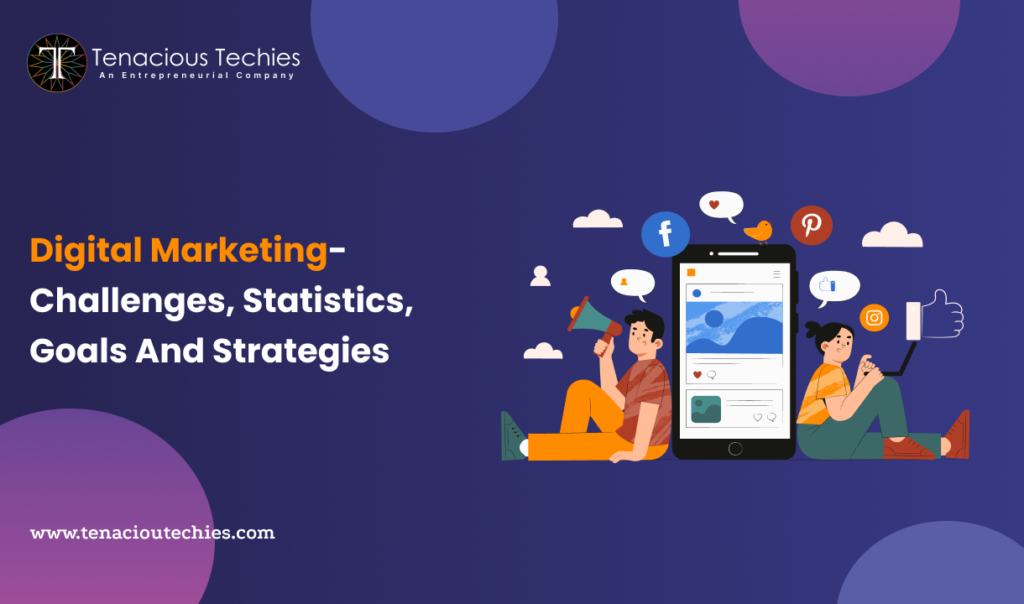Introduction: What is Digital Marketing?
All marketing activities that take place online are referred to as digital marketing, often known as online marketing. To engage with present and potential customers, businesses use digital channels including search engines, social media, email, and other websites. This also involves messaging via text or other types of multimedia.
Digital marketing is defined as the process of connecting with customers online, where they spend a large portion of their time. The most effective digital marketers have a clear understanding of how each campaign supports its main objectives. Marketers can support a broader campaign through the available free and paid channels, based on the objectives of their marketing plan.
What makes digital marketing so crucial?
Digital marketing enables you to target the customers most likely to purchase your goods or services and reaches a wider audience than previous approaches could. Additionally, it allows you to monitor progress on a daily basis and pivot as necessary, and it is frequently more affordable than traditional advertising.
A few of the main advantages of digital marketing are:
- Only the prospects who are most likely to buy your product or service should receive your attention.
- It is more affordable than outbound marketing strategies.
- By leveling the playing field within your sector, digital marketing enables you to compete with more established brands.
- Digital advertising may be measured.
- A digital marketing plan may be modified and adjusted more easily.
- Your conversion rate and the caliber of your leads can both be increased through digital marketing.
- With digital marketing, you can involve audiences at every level.

Digital Marketing Challenges
Every company faces unique challenges in addition to some common ones. According to the Gartner survey, internal worries about creating and sustaining cross-functional teams will be the top obstacle, according to digital marketing leaders.
What an intriguing viewpoint. Your team is your most significant asset, therefore finding the appropriate people and keeping them on board may be the obstacle to reaching goals.
Executing an omnichannel digital marketing plan will be a significant challenge. Your customers are engaging with your brand across a wide range of devices and platforms, regardless of your industry. You will want a technology platform that addresses this in order to get past it.
Digital marketers also have to contend with changes to Google’s algorithm and the E-A-T concept. Google like keeping us guessing and hardly ever shares what’s going on behind the scenes.
Continue to keep an eye on Google’s actions and your SEO performance to stay on top of this.
- Learning about customers
- The observance of privacy and data-sharing laws
- Developing a mobile-first strategy and an omnichannel marketing plan
- Maintaining brand consistency across all media
- Selecting the best marketing avenues; remaining current with newly required skill sets
- Measuring outcomes accurately
Digital Marketing Goals
CMOs and other marketing executives voiced their opinions in the Gartner 2021 Digital Marketing Survey.
The main objectives were to raise lead quality, enhance sales from identified leads, broaden brand awareness, and attract new clients.
The findings of another Prophet study that was posted on MarketingCharts.com are comparable. Priorities included growing the percentage of expenditure and revenues, introducing new goods, enhancing brand awareness, and gaining new customers.
KPIs for digital marketing are typical. You can view everything you need to know about SEO, content performance, website traffic, social media interaction, and much more as long as you have all the necessary plug-ins and codes.
- Publish a certain number of articles and/or educational materials each month.
- Increasing ROI by x%;
- Increasing ROAS by x%;
- Gain % points in domain authority;
- Increase x% in brand awareness;
- x% increase in social media followers;
- Increase x% in organic traffic;
- x% increase in the Lead to MQL ratio
- x% increase in the MQL to SQL ratio;
- Gain x% more new clients per month;
- Retain x% of current clients.
Statistics of Digital Marketing
Marketers who do not now employ automation or artificial intelligence (AI) expect to do so by 2022, according to a source;
Businesses stated that they plan to spend more on content creation in 2022 (source);
In social responsibility efforts, 45% of marketers want to invest (source);
Virtual reality (VR) and augmented reality (AR) marketing budgets are expected to increase by 42% (source);
The top three positions that marketing leaders will focus on filling are content marketers, content strategists, and content creators (source);
Mobile is the platform where consumers interact with brands more frequently than any other (source);
57% of consumers claim they wouldn’t endorse a company with a shoddy mobile website (source);
63% of content marketers employ their content strategy to foster client loyalty (source);
Around 120 million people listen to podcasts each month, according to one statistic, and 17% of marketers intend to use them as part of their content marketing strategy.
Digital Marketing Tools
Use the appropriate tools if you want to achieve your digital marketing goals. Not simply the appropriate tools, but also knowledge about how they should interact, prerequisite requirements, and more.
Finding the perfect ones, setting up demos, and making decisions take time, but having the correct tools by your side will be very beneficial in the long run.
Try AI Marketing first.
AI marketing is similar to social media video clips. The sooner you get on board with it, the simpler it will be to stay ahead of the curve because it is here to stay.
Use AI marketing copy generators to begin
If you have a constant companion in your pocket who can brainstorm content ideas with you, use your keywords to generate fresh text ideas for your articles, social media captions, emails, and more, scaling content creation will be much simpler.
Growth Narratives
Growth storytelling is all about telling experiences.
Storytelling mixes audience insights in the form of quantitative and qualitative data with marketing and commercial objectives wherever possible.
This knowledge should be kept in mind as marketers engage more in big data and data-driven marketing tactics to avoid making common attribution or customization mistakes and to ensure the best possible customer experience and measurable ROI.




